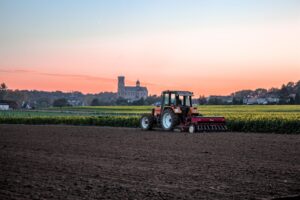 An engineering team from the University of Utah has received a $1.9 million grant from the U.S. Department of Energy to design and build a sensor system to help farmers make changes in how they grow and harvest crops that ultimately helps to reduce carbon emission.
An engineering team from the University of Utah has received a $1.9 million grant from the U.S. Department of Energy to design and build a sensor system to help farmers make changes in how they grow and harvest crops that ultimately helps to reduce carbon emission.
USTAR associate professor Hanseup Kim, USTAR professor Carlos Mastrangelo – both in the U’s Department of Electrical and Computer Engineering – along with Peter D. and Catherine R. Meldrum Endowed Professor Milind Deo in the U’s Department of Chemical Engineering, and University of Nebraska-Lincoln agronomy and horticulture associate professor James Schnable received the grant from the Advanced Research Project Agency-Energy (ARPAE) in the Department of Energy. They will design and build a self-sustaining carbon sensor system that can be deployable in the feedstock lands and generate geo-mapping of carbon distribution in the land via machine-learning algorithms.
Soil carbon sequestration can help to slow the cycles of greenhouse gas absorption and release between the earth and the atmosphere and ultimately suppress carbon footprints and on-going climate changes. The team of researchers are working toward that goal by enabling the distributed sensor network for in situ and real time in-soil carbon flux and amount monitoring, which is critical in maximizing the efficiency of the land use for both productivity and carbon sequestration. Currently, there is no scalable in-soil carbon measurement system available.
The research will benefit the feedstock producers by allowing them to make small changes in their farming methods such as time and volume of ploughing, crop burning, and fertilizer application. All of these farming methods are responsible for oxidizing the soil carbon and releasing them as CO2 into the air, creating higher concentrations in the atmosphere. It is believed that by tuning the farming methods, ethanol production can be made carbon-negative and greenhouse gas emissions can be cut by 46%. Near the end of the three-year research project, Kim and his team want to conduct a trial with the sensors on an 80-acre piece of land.